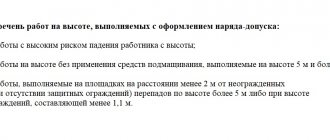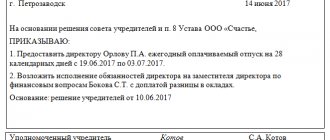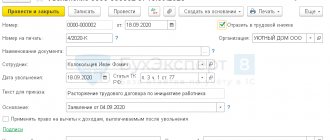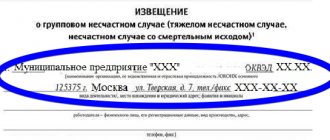The head of even a small company sometimes has to convene commissions to resolve some internal issues of the organization. The tasks of these commissions can be different - assessing working conditions, investigating an accident, certifying workers... The owner of an enterprise has no right to solve such problems alone (after all, he is an interested party), so a group of specialists must deal with them. True, it still gathers on the orders of the manager, and this act still needs to be correctly drawn up and executed.
Creation of a medical commission
A medical commission must be created in absolutely any medical organization, regardless of whether it is state, municipal or private, how many specialists work in it, and what medical services are provided.
The decision to create a medical commission is made by the head of the medical institution and is formalized by an appropriate order.
In addition, the head also approves a separate local act - the Regulations on the Medical Commission. The Regulations must define the goals, objectives and functions of the medical commission, the procedure for work, accounting and reporting on the results of activities, the composition of the medical commission and other provisions that are important for its functioning.
If necessary, more often in large multidisciplinary healthcare institutions, subcommittees can be formed as part of the medical commission. This should also be reflected in the Order and Regulations. It is recommended to adopt a local act on subcommissions also in the form of a Regulation, which may be included in the number of appendices to the main Regulation on the medical commission.
Order on the creation of a commission for special assessment of working conditions
A special assessment of working conditions (SOUT) is a set of measures designed to identify all the dangerous and harmful factors that affect workers and harm their health. The need for a special assessment is determined by the Labor Code and Federal Law No. 426-FZ “On Special Assessment of Working Conditions”. These acts can and should be mentioned in the justification of the order, before the main text.
The main goal of the special assessment commission is to make a verdict regarding the presence or absence of such harmful factors in the company’s office. This is precisely the task that needs to be specified in the order. At the same time, it is advisable to specify it, breaking it down into separate subparagraphs:
- approve the schedule for carrying out the special assessment;
- draw up a list of jobs that will be assessed by the commission;
- ensure that committee members are provided with all necessary materials;
- The chairman monitors the work at all stages, as well as organizes meetings of the commission when necessary.
The commission must work in its entirety.
Composition of the commission
The medical commission is headed by a chairman, who can be either the head of the medical organization or his deputy.
Deputy heads are appointed as chairmen of subcommittees. At the same time, the official duties of the deputy should include resolving issues within the competence of the commission (subcommittee). The Chairman bears full responsibility for the activities and decisions made by the commission (subcommittee). The chairman has one or two deputies.
To ensure the activities of the commission, its secretary is appointed to perform the following functions:
- drawing up schedules of meetings of the medical commission (its subcommittee);
- preparing materials for the meeting;
- notifying members of the medical commission (its subcommittee) about the date and time of the meeting;
- registration of decisions of the medical commission (its subcommittee) and maintaining a special journal in which the decisions taken are taken into account;
- organization of storage of materials from the work of the medical commission (its subcommittee).
Heads of structural units and/or medical specialists from among the employees of the medical organization are appointed as members of the medical commission (subcommittee). It is important to note that members of the commission cannot be members of the nursing staff. Thus, by the Resolution of the Uzhursky District Court of the Krasnoyarsk Territory dated May 22, 2021 in case No. 5-26/2019, the inclusion of a senior nurse - a specialist with a secondary medical education of the commission in the medical OGBU "Susaninsky Psychoneurological Boarding School" - was regarded as a violation of licensing requirements
The minimum number of commission members is not defined in regulatory documents, however, to minimize problems when making decisions, it is advisable to include at least 4 members, not counting the secretary, chairman and his deputies.
The regulations do not define clear requirements for the qualifications of commission members. Obviously, each member must have a diploma of higher medical education and a valid specialist certificate. If the commission performs specific functions, for example, examination of work ability, then it is necessary to have valid certificates of advanced training in thematic advanced courses (Decision of the Zadneprovsky District Court of Smolensk dated June 19, 2021 in case No. 12-102/2019).
What is needed to establish this working group?
There are two fundamentally important stages, which involve the creation and approval of a special commission for social insurance at the enterprise:
- The director of the enterprise is obliged to draw up and sign a special order on the creation of such a public insurance apparatus.
- The council of the trade union organization must announce the election of members to this commission.
If the enterprise does not have a trade union, then its role can be played by the entire workforce of the organization.
In cases of failure to comply with their duties by any elected member of the group or its head, by decision at a general meeting, he may be expelled from its membership. All changes must be recorded. The party whose representative was the expelled comrade must nominate another candidate for his post.
All speaking parties nominate a strictly equal number of candidates for membership in the commission. At the first meeting, they all go through the approval procedure by open voting. The head (chairman) is also appointed, also by generally accepted decision. His deputy must be a representative of the other party. For example, if the head of a commission is elected from a trade union, and his deputy cannot also be a member of this organization.
Issues regarding the deprivation of powers of the last two are submitted for consideration only after the approval of the majority of the composition and on grounds that have nothing to do with personal interests.
If for some reason there are several trade unions at the same enterprise, then nominations on their behalf are carried out only after they have temporarily united to make this decision.
All rights and obligations, as well as the functions of the commission at the enterprise, are set out in the regulations on the commission (authorized) for social insurance.
Learn more about the Social Security Commissioner's work plan.
You can view a sample of this provision here:
Sample regulations on the social insurance commission at an enterprise
1 file(s) 32.50 KB
Activities of the medical commission
The basic form for the commission to exercise its functions is a meeting, which can be held both scheduled and unscheduled. The schedule of meetings is approved by the head of the medical organization of the commission, taking into account the establishment of the frequency of meetings at least once a week. Violation of the minimum frequency of scheduled meetings, even if a different schedule is provided for in the local act of the medical organization, is regarded as a violation of licensing requirements and entails administrative liability. (Resolution of the Kimry City Court of the Tver Region dated June 25, 2021 in case No. 5-61/2019)
An unscheduled meeting in situations requiring an urgent decision is held based on the decision of the manager as necessary.
Based on the results of the meeting, a decision is made, documented in the form of a protocol. More information about the minutes of the meeting of the medical commission is described in the article “Requirements for the execution of the decision of the medical commission (protocol of the medical commission).”
The decision of the medical commission (subcommittee of the medical commission) is considered adopted if it is supported by two thirds of the members of the medical commission (subcommittee).
The chairman of the medical commission is obliged to provide written reports on its activities to the head of the medical organization. The frequency of reports is quarterly and annually.
What types of organizations are required to ensure the work of the commission?

Depending on the number of insured workers, as well as the form of operation of the institution, the mandatory nature of the organization of this group, its composition and tasks are determined.
Regardless of the form of ownership (state or private), if an organization uses hired labor, then it is obliged to ensure the existence of the commission .
Also, those enterprises that operate under the single tax payment system must organize the work of this social insurance service.
If the number of employees with insurance is less than fifteen, then a working group for monitoring social security can be created by an individual decision, as has already been mentioned. But initially, at the general meeting, an authorized person is appointed to perform this type of function, and the rest of the composition will include a representative determined by the hirer. Or the employer may wish to independently monitor the activities of the delegate.
In cases of large-scale production, in which the number exceeds a thousand, a single central commission is first organized. To help her, additional working groups are created for each individual unit.
When an enterprise has more than fifteen employees with public insurance, the commission is created from applicants selected by management, as well as from a representative of insured citizen employees. Usually its role is performed by a trade union.
Powers of the medical commission
Order No. 502n defines a wide range of functions performed by medical commissions. These include:
- Making decisions on issues of prevention, diagnosis, treatment, medical rehabilitation and sanatorium-resort treatment of citizens in the most complex and conflict situations requiring commission consideration.
- Determination of the working capacity of citizens.
- Extension of certificates of incapacity for work in the following cases:
- when the period of temporary disability exceeded 15 calendar days;
- issuance and extension of certificates of incapacity for work over the past period.
- Making a decision on the issue of referring the patient for a medical and social examination.
- Conducting an examination of the professional suitability of certain categories of workers
- Assessing the quality, validity and effectiveness of diagnostic and treatment measures, including the prescription of medications.
- Making a decision on prescribing medications if there are medical indications (individual intolerance, for health reasons):
- not included in the appropriate standard of care;
- by trade names.
- Sending messages about identified cases to Roszdravnadzor:
- side effects of medications not specified in their instructions;
- serious and/or unexpected adverse reactions when using medications, including when this resulted in the need to replace the drug with a drug that is not included in the standard of care or with a drug with a specific trade name.
- Assessment of compliance in a medical organization with the established procedure for maintaining medical records
- Development of measures to eliminate and prevent violations in the process of diagnosing and treating patients.
- Studying each case of patient death in order to identify its cause.
- Development of measures to eliminate violations in the activities of the medical organization and medical workers that led to the death of the patient.
- Making decisions on the issues of prescribing and adjusting treatment in order to take into account patient data when providing medications in accordance with the legislation of the Russian Federation
- Making decisions on prescribing medications in a special manner, including:
- narcotic and psychotropic drugs;
- medications, which are provided in accordance with the standards of medical care according to prescriptions from a doctor (paramedic) when providing state social assistance in the form of a set of social services.
- Selection of patients, generation and submission of a set of documents to provide them with high-tech medical care according to quotas.
- Issuance of a medical opinion on the presence (absence) of medical indications and contraindications for medical rehabilitation and sanatorium-resort treatment of citizens.
- Issuance of a conclusion on the need of a veteran to be provided with prosthetics (except dentures), prosthetic and orthopedic products.
- Carrying out a medical examination of suspects or accused of committing crimes to determine whether they have a serious illness that prevents their detention.
- Conducting mandatory preliminary and periodic medical examinations (examinations) of workers engaged in heavy work and work with harmful and (or) dangerous working conditions.
- Issuance of a certificate confirming the absence of medical contraindications for working using information constituting a state secret
- Issuance of a medical conclusion that when organs and tissues are removed for transplantation (transplantation) from a living donor, significant harm will not be caused to his health
- Analysis of morbidity, including maternal and newborn infections, of nosocomial infections.
- Development and implementation of measures to prevent the incidence of nosocomial infections.
- Organization and conduct of internal control of the quality and safety of medical activities (by decision of the head of the medical organization).
- Interaction in work on issues within the competence of the medical commission, with the Compulsory Medical Insurance Fund, the Social Insurance Fund, Roszdravnadzor, Rospotrebnadzor, medical and social examination institutions, with medical insurance organizations, and other bodies and organizations.
- Consideration of requests (complaints) on issues related to the provision of medical care to citizens.
- Carrying out other functions provided for by regulations.
The presented list is general; its mechanical transfer to the Regulations on a specific medical commission is unacceptable, since a number of functions depend on the profile of the medical organization and the existing license.
What types of payments does this structure control?
There is an approved list of social guarantees that every insured citizen can count on. The Social Insurance Commission monitors its compliance.
The correctness and timeliness of making all agreed payments, as well as the reasoning for refusals to assign them or suspend them, is controlled by this public body. Which, by the way, usually operates on a public basis, but this issue can be considered by each employer individually.
The issuance of forms of temporary incapacity, verification of its accuracy and any other documents that allow receiving compensation for losses are also required to be monitored by the public insurance commission.
So, a list of material subventions, the assignment and implementation of which should be taken care of by this particular organization:
- Payments related to maternity assistance (how to get pregnancy benefits?).
- Material subvention for a newborn and further payments until he reaches the age of three (how to apply for a child benefit up to 3 years of age?).
- Reimbursement of expenses incurred from ritual burial procedures. Excluded are those circumstances that are associated with an accident, pensioners or officially unemployed (how to get a funeral benefit?).
- Subventions for temporary loss of ability to work or for caring for a sick family member (social insurance for temporary loss of ability to work).
- Organization of treatment and preventive measures for the employees of the enterprise themselves or for their family members, in cases prescribed by law and the rules of the institution.
- Costs for any organizational events at the state level. For example, allocating funds for employees to buy New Year's gifts for children under fourteen years of age.
Each of the above-mentioned articles of social insurance is subject to consideration by a social insurance commission organized at the enterprise.
Let's take a closer look at some of the functions of the medical commission.
Quality control of medical care
The function of quality control of medical care is one of the main ones and is carried out by all medical commissions. Its implementation includes activities for:
- assessing compliance in a medical organization with the established procedure for maintaining medical records;
- development of measures to eliminate and prevent violations in the process of diagnosing and treating patients;
- studying each case of death of a patient in order to identify its cause, as well as to develop measures to eliminate violations in the activities of the medical organization and medical workers that led to the death of the patient;
- organizing and conducting internal control of the quality and safety of medical activities;
- consideration of requests (complaints) on issues related to the provision of medical care to citizens.
Making decisions about prescribing medications
The participation of the medical commission in prescribing medications is regulated by the Procedure for prescribing medications, forms of prescription forms for medications, the procedure for completing these forms, their recording and storage, approved. By Order of the Ministry of Health of Russia dated January 14, 2019 No. 4n
An appropriate decision of the commission is required to prescribe medications:
- in the presence of medical indications (individual intolerance, for health reasons);
- not included in the appropriate standard of care;
- by trade names;
- when five or more medications are simultaneously prescribed to one patient within one day or more than ten items within one month;
- in case of an atypical course of the disease, the presence of complications of the underlying disease and (or) concomitant diseases, when prescribing medications, the interaction and compatibility features of which, according to the instructions for their use, lead to a decrease in the effectiveness and safety of the patient’s treatment and (or) create a potential danger to life and health patient.;
- citizens entitled to receive state social assistance in the form of a set of social services, in accordance with the list of drugs for medical use;
Making decisions on the prescription of narcotic and psychotropic drugs
Narcotic and psychotropic drugs are prescribed by a medical commission if the following conditions are simultaneously present:
- the drugs are included in lists II and III of the List of narcotic drugs, psychotropic substances and their precursors subject to control in the Russian Federation, approved. Decree of the Government of the Russian Federation of June 30, 1998 No. 681;
- drugs are prescribed for the first time;
- The head of the medical organization decided on the need to coordinate the prescription of such medications with the medical commission.
Extension of certificates of incapacity for work
As noted above, the medical commission, according to Art. 59 of the Law on the Fundamentals of Protecting the Health of Citizens and Order of the Ministry of Health and Social Development of the Russian Federation of June 29, 2011 No. 624n “On approval of the procedure for issuing certificates of incapacity for work” (hereinafter referred to as Order No. 624n) by its decision extends certificates of incapacity for work for a period of more than 15 days, and also issues and renews them for the previous time. All members of the commission (subcommittee) must have valid documents confirming completion of training on the examination of temporary disability.
Conducting a professional suitability examination
The medical commission can determine the professional suitability of workers and decide on admission (non-admission) to work. So in accordance with Part 3 of Art. 24 Federal Law No. 323, an employee may be recognized by a medical commission of a medical organization, based on the results of a professional fitness examination, as temporarily or permanently unfit for health reasons to perform certain types of work. This authority is exercised by a medical commission during medical examinations. A medical organization must have a license for this type of activity. It is important to note that in addition to workers engaged in harmful and dangerous work, medical examinations are also carried out by minor workers, teachers, retail workers, workers whose activities are related to transport management, etc. Lists of medical contraindications for certain types of professional activities are established by Decrees of the Government of the Russian Federation.
Making decisions about sending a patient for medical and social examination
In addition, the medical commission refers the patient to undergo a medical and social examination in case of:
- obvious unfavorable clinical and labor prognosis no later than four months from the date of onset of temporary disability;
- a favorable clinical and work prognosis no later than ten months from the date of onset of temporary disability in conditions after injuries and reconstructive operations and no later than twelve months in the treatment of tuberculosis (Part 4 of Article 59 of Federal Law No. 323).
Model regulations on the committee. Work plan. Participation in testing knowledge on labor protection
It should be noted that the order on the appointment of a labor safety commission mentions the provision on the creation of a labor safety commission. It is developed by the administration on the basis of a standard document (approved by order 412n) taking into account the specifics of the enterprise’s activities.
Every year the committee draws up a work plan, which includes the necessary activities that the commission has the right to carry out. In particular, the committee is authorized to:
- Request and receive from the labor protection service information about working conditions at the enterprise, hazardous factors to health and measures to neutralize them.
- Invite the administration to its meetings, listen to the opinions of its representatives on issues of ensuring labor safety and compliance with guarantees and rights of workers.
- Analyze cases of injury and recommend measures to be taken against the offenders.
- Participate in resolving labor disputes related to labor protection.
A separate point should be mentioned that, by virtue of para. 2 clause 10.8 of GOST 12.0.004-2015, which came into force on 03/01/2017, committee members can participate in the commission for testing knowledge on labor protection.
Based on the results of its activities, the committee reports at least once a year to the workers of the organization or their elected (representative) body. If the results are unsatisfactory, the question may arise about the re-election of commission members representing employees.
Appeal against verdicts

Quite often, in cases of a negative decision or regarding the amount of subventions, there are appeals against the commission’s decisions. This process also requires compliance with a certain set of rules and is strictly logged.
The application is submitted directly to the federal social insurance service of the corresponding territorial unit. In addition, it is quite acceptable to appeal the commission’s verdict to a judicial authority.
In accordance with the innovations in the legislative resolution on the work of this commission, the deadline for filing an appeal is limited to five working days from the moment the letter with the decision was received.
The insured person cannot file a dispute after their expiration.
Form of work and direct obligations

The main form of work of the social insurance commission at an enterprise or any other institution is meetings . Regulatory acts stipulate that these must be carried out without fail at least twice a month. In separately specified cases, one is permissible, but this is strictly agreed with the employer.
Each member of the commission is required to attend meetings in person. No one can delegate their powers to others. Decisions are made by a majority vote on issues brought up for discussion.
In order for the meeting to be considered held, and all decisions made at it to be recognized as valid and fair, at least two thirds of the total composition of the working group must be present.
If a situation arises with an equal distribution of the number of votes for and against, then the vote of the chairman will be decisive in rendering the verdict.







